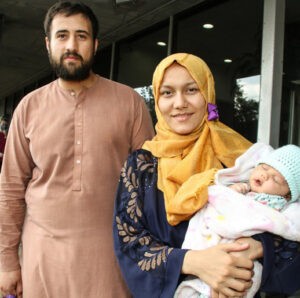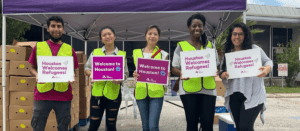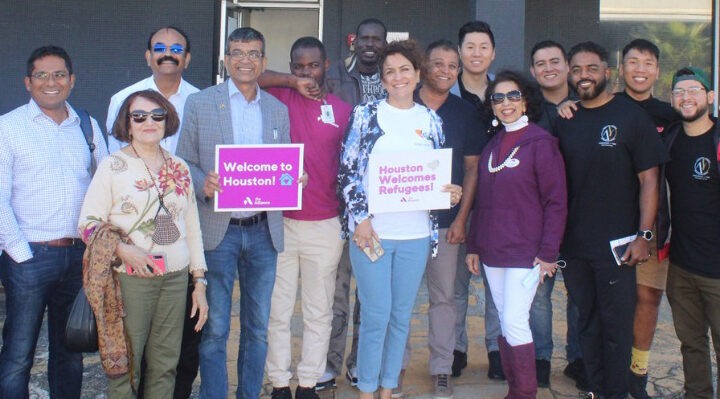In the last several months, the United States has welcomed more than 74,000 Afghans who fled their country after the Taliban seized power in the wake of the U.S. withdrawal of troops from the country.
One of the organizations that helps to resettle them in the U.S is The Alliance, a Houston-based organization. Through its Afghan Allies Program, The Alliance “provides resettlement support to individuals and families from Afghanistan seeking to rebuild their lives in Houston,” and has, as of December “resettled 600 Afghan allies to Houston,” according to data from its website.
An ABC News report in October stated that in Houston “most refugees start their lives around the Hillcroft area, where The Alliance, a nonprofit organization, operates a leading refugee resettlement program.”
Assistance to these Afghan refugees typically starts with a welcoming smile at the airport. From there, they are moved to new homes and helped to resettle in a new environment through cultural orientation and culturally appropriate community support. The Alliance also offers educational and employment opportunities, mental health support, entrepreneurship programs, financial literacy and cash support.

An Afghan couple with child helped by The Alliance
Like Afghan immigrants resettled in different parts of America, many of those who move to Houston expressed joy at escaping the Taliban, which seized control of the government of Afghanistan in mid-November, and finding a new home in the city. The Taliban is feared in Afghanistan for its strict interpretation of Islamic laws
One of the newly arrived Afghans now based in Houston is Sarbar-Mohammad Qasemi. He told BNG in late December that he arrived in Houston in mid-November and was resettled by The Alliance two weeks later. But in a city where housing is in short supply and rents are high, the apartment provided to Qasemi was not in great condition. The new arrivals had to chase off cockroaches and other intruders while also struggling with little money.
Such problems are not unique to The Alliance. Another Afghan national who has lived in Houston for years said many Afghans, irrespective of the organization that facilitated their welcome, have reported one issue or the other they were not happy about. But many of them are nonetheless happy to be in America.
“The condition in Afghanistan was too bad. So, it’s too good to be here,” explained Qasemi, who added that he earned a master’s degree in criminology in his country but already is thinking of diversifying to make ends meet and support his wife and children who are in America with him.
Mohammed Ibrahim Mojaddedi, an Afghan-born American citizen and member of an Afghan community committee that helps mobilize financial and material support for the newly arrived Aghans in Houston, said many of his countrymen and women are happy to be in America because of the impression people have of the country as a land of opportunity.
The circumstances prior to and after the takeover by the Taliban led to chaos, Mojaddedi said. “It was chaos. We all saw it on TV. A lot of people got killed, a lot of people got injured, some people got lucky and then came here. They came to America with hope, with hope to build something, a better life. They are happy that they are here. America outside the country is considered to be a land of opportunity.”
But even immigrants fleeing dire circumstances have to adjust to life in America, as it is not easy to live in a foreign land.
Gislaine Williams, community relations director for The Alliance, said the organization aims “to provide the best services we can to all of our clients and take any complaints or concerns seriously.” They have processes in place to help address problems identified and reported among the huge numbers of immigrants they serve.

Gislaine Williams
The agency’s work includes not just housing but a number of social services, she said. “These include refugee resettlement services, programs to support survivors of human trafficking, financial coaching and counseling, adult education, vocational trainings, job placement, small business microloans and technical support, mental health services, among others.”
An immigrant from Honduras herself, Williams added that the organization helps residents “through all stages of their journey, from recovering during disasters to reaching major milestones like purchasing their first car or home in the United States,” and that all these “services are free to the community.”
In line with its vision of assisting immigrants or refugees achieve their dreams, The Alliance partners with some groups, including religious bodies like Islamic Relief USA, to make this happen, Williams said. “We partner with faith-based organizations and volunteers to provide donations, financial assistance, and mentorship for newly arrived refugees and underserved community members.”
The Alliance also works with a number of federal, city and county agencies to provide critical programs to the community as well as local private foundations and corporations to sustain its work and bring relief to the community members it serves. But its work also relies on the generosity of community members and public-spirited individuals.
Fundraising is only one form of giving it seeks, however. The Alliance also benefits from a volunteer program that attracts different talents to its fold, thus ensuring it is not short of people to help it achieve its various objectives. This makes its workforce as diverse as the people it serves.
“We are always seeking volunteers passionate about making a difference in our diverse community,” Williams explained. “We have a number of different volunteer opportunities to support our programs, services and special events.”
Volunteer opportunities include openings for advocacy, awareness and outreach as well as for foreign language interpretation or translation — which includes Spanish, Arabic, Swahili, Pashto, Somali and other languages.
 As with many social-service organizations worldwide, the coronavirus pandemic and its effects on their staff and volunteers over the past year never will be forgotten. And Williams said the immigrant and refugee communities were no less affected.
As with many social-service organizations worldwide, the coronavirus pandemic and its effects on their staff and volunteers over the past year never will be forgotten. And Williams said the immigrant and refugee communities were no less affected.
“Many of our clients have been impacted by COVID-19, either through loss of work or illness,” she said. “We assisted our clients early on during the pandemic by providing emergency food, water and hygiene assistance to ensure everyone had their basic needs met. We have hosted a weekly job search webinar and job coaching services to help people secure new employment opportunities. We also have administered an eviction intervention program to help more than 1,000 community members remain in their homes by providing emergency rental assistance.”
With the U.S. now poised to welcome even more immigrants to the U.S, The Alliance is ready to continue to play its part in making them feel at home, create opportunities that would enable them to “achieve their goals for self-sufficiency and improve their quality of life.”
The Biden Administration is providing funding to support resettlement for up to 95,000 refugees from Afghanistan through Operation Allies Welcome.
That’s good news for the rescued refugees, but it also may be good news for the U.S. economy, according to a new report by U.S. Immigration Policy Center that shows refugees “do not negatively impact state and local fiscal health” and in some cases, “refugees have revitalized towns with declining populations and brought businesses and cultural centers.”
In sum: “Interviews with resettlement agencies, local officials and community support groups indicate that refugees can bring positive cultural and economic contributions to the communities they live in, particularly where community and faith organizations play strong roles.”
Anthony Akaeze is a Nigerian-born freelance journalist currently living in Houston.
Related articles:
Afghan refugees are being screened safely, security experts assure governors
Supporting the influx of Afghan refugees is bringing divided Americans together
Broad support for helping Afghan refugees does not uniformly extend to all refugees


